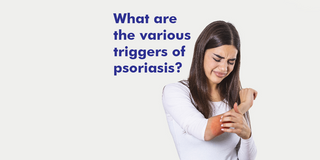Psoriasis is a chronic autoimmune skin condition characterized by the rapid buildup of skin cells, leading to the formation of thick, red and scaly patches. While the exact cause of psoriasis is not fully understood, various triggers can exacerbate the symptoms and contribute to the development of psoriasis flare-ups. Understanding the triggers is important for managing the condition effectively.
1. Genetic Factors:
Psoriasis often has a strong genetic component, with specific genetic markers contributing to its development. Individuals with a family history of psoriasis are more susceptible, but the condition can also manifest in those without a familial inheritance. Understanding the genetic factors involved is vital for both diagnosis and tailored therapy approach in the management of chronic skin disorder.

2. Immune System Dysfunction:
Psoriasis is an autoimmune condition where the immune system mistakenly attacks healthy skin cells. T cells, a type of white blood cell, become overactive and trigger inflammation, leading to the rapid production of skin cells. This immune system dysfunction significantly contributes to the onset and progression of psoriasis.

3. Environmental Triggers:
External factors can trigger or worsen psoriasis symptoms. Common triggers include infections (particularly streptococcal infections), skin injuries or trauma (such as cuts, burns or insect bites) and stress. Exposure to certain environmental factors may activate the immune system and precipitate the onset of psoriasis or exacerbate pre-existing symptoms.

4. Stress and Emotional Factors:
Emotional stress is a well-known trigger for psoriasis flare-ups. High levels of stress can stimulate the immune system and exacerbate inflammation. Emotional factors such as anxiety and depression can influence the severity and frequency of psoriasis episodes.

5. Hormonal Changes:
Hormonal fluctuations, such as those occurring during puberty, pregnancy and menopause, can impact the severity of psoriasis symptoms. Decreased levels of estrogen during menstrual cycle may correlate with psoriasis flare-ups. Women often report changes in the severity of psoriasis during pregnancy, with some experiencing improvement (may be due to high levels of estrogen) while others may experience a worsening of symptoms (may be due to low levels of estrogen after baby’s birth).

6. Enzymatic modification:
Enzymatic triggers of psoriasis include elevated activity of phosphodiesterase 4 (PDE4), tyrosine kinases, matrix metalloproteinases (MMPs) and cathepsins. These enzymes contribute to inflammation, tissue remodeling and aberrant immune responses in psoriatic lesions, highlighting their role in disease pathogenesis and potential as therapeutic targets.
Elastase enzyme in psoriasis, contributes to tissue degradation and inflammation by breaking down elastin fibers in the skin. Elevated elastase activity can disrupt skin integrity, exacerbating psoriatic lesions and promoting inflammatory responses. Targeting elastase activity may offer a therapeutic approach to mitigate tissue damage and inflammation in psoriasis management.

7. Medications:
Certain medications such as lithium, antimalarial drugs and beta-blockers may trigger psoriasis or aggravate existing symptoms. It is important for individuals with psoriasis to inform their healthcare providers about any medications they are taking including prescription, over-the-counter drugs (OTC), nutritional or herbal supplements.

8. Smoking and Alcohol Consumption:
Individuals with modern lifestyle factors like smoking cigarette and excessive alcohol consumption has been related to increase the risk of psoriasis and likely to exacerbate the more severe symptoms. These factors can contribute to inflammation and negatively impact the health of an individual, also making psoriasis management more challenging by decreasing the effectiveness of the medicine.

In conclusion, psoriasis is influenced by a combination of genetic, immunological, environmental and lifestyle factors. Identifying and managing these triggers is essential for effectively reducing psoriasis symptoms and improving the overall quality of life for individuals who are suffering from this chronic skin illness.
We recommend Psorolin - B ointment which is effective for all types of psoriasis. Formulated with strong anti-inflammatory agents like Boswellic acid and Red ochre to reduce the release of inflammatory mediators – TNF α, IL -6 and IL -8. Also, it reduces dryness and scaling and acts on enzymes such as elastase that worsen psoriasis.
To know more about the product, click on the following link: https://www.caredurastore.com/collections/frontpage
It is advisable for individuals with psoriasis to consult healthcare professionals to develop a comprehensive treatment plan tailored to their specific needs and triggers.


